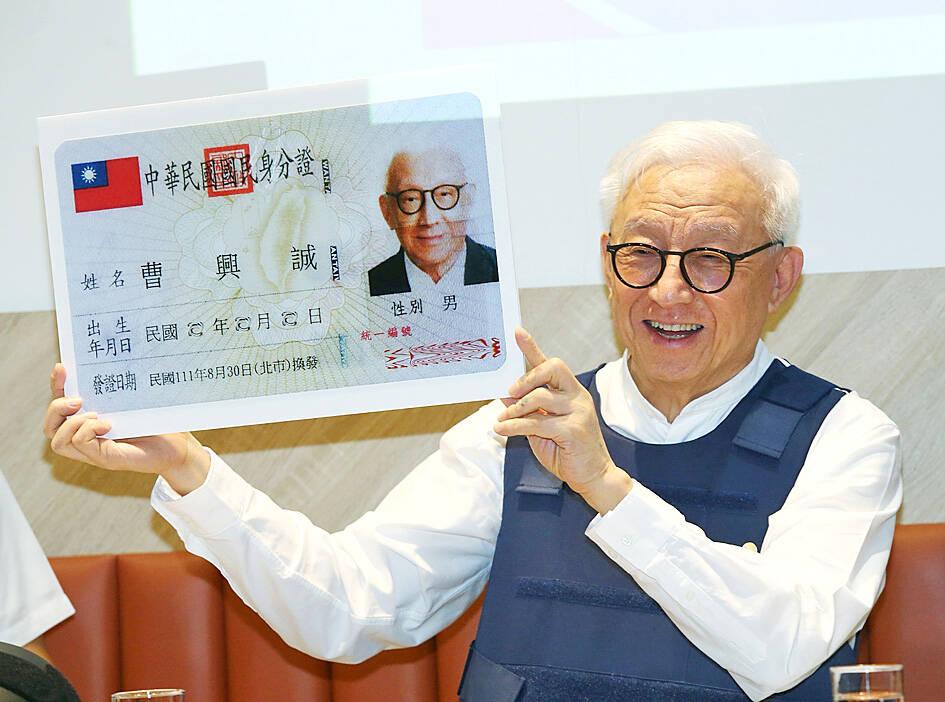A colorful semiconductor tycoon yesterday unveiled plans to train more than 3 million “civilian warriors” to help defend the nation in the event of a Chinese invasion, donating NT$1 billion (US$32.8 million) of his own money.
Robert Tsao (曹興誠), 75, is one of Taiwan’s most successful businessmen and founded major chipmaker United Microelectronics Corp (UMC, 聯電). He has been increasingly outspoken against Beijing, and his pledge came after Chinese troops put on a huge show of force near the nation after US House of Representatives Speaker Nancy Pelosi visited Taipei last month.
For a week after Pelosi’s visit, China sent warships, missiles and fighter jets into the waters and skies around Taiwan, its largest and most aggressive exercises since the mid-1990s.

Photo: CNA
Tsao warned it would be “an intentional slaughter and vicious war crime and crime against humanity” if China were to use force against Taiwan.
The tycoon said he would put NT$600 million toward training 3 million “black bear warriors” in the next three years, adding that they could work alongside the military.
Another NT$400 million would be used to train 300,000 “marksmen” with shooting skills, he said.
Tsao, who no longer holds any position or title at UMC, said the risk posed by China is existential.
“The Chinese Communist Party’s threat to Taiwan is growing and the fight against [it] stands for freedom against slavery, democracy against authoritarianism and civilized against barbaric,” he said.
“If we can successfully resist China’s ambitions, we not only will be able to safeguard our homeland, but make a big contribution to the world situation and the development of civilization,” he added.
Taiwan has spent decades living alongside China’s threats, but the saber-rattling has become more pronounced under Chinese President Xi Jinping (習近平).
China’s most authoritarian leader in a generation, Xi is on the cusp of securing an unprecedented third term later this year and has made gaining Taiwan a key part of his “national rejuvenation” goals.
Taiwan remains massively outgunned, with 88,000 ground forces compared with China’s 1 million troops, the US Department of Defense says.
Mandatory military service for Taiwanese men is just four months, and Taiwanese and US strategists have increasingly pushed Taipei to adopt a “porcupine” strategy of asymmetric warfare, which would include training civilians to fight.
Russia’s stalled invasion of Ukraine has also focused attention in Taiwan on the threats posed by a giant authoritarian neighbor and how huge armies can be resisted by a much smaller, but determined defender.
Tsao yesterday also announced that he had regained Taiwanese citizenship.
Showing an enlarged copy of his Republic of China identification card, Tsao told reporters that he had renounced his Singaporean citizenship, which he obtained in 2011, and was “so excited” to have his original citizenship restored.
From now on, he would stand with his “courageous compatriots” against any invasion by China and ensure that Taiwan remains “the land of the free and the home of the brave,” he said, likening Taiwan to the US.
Additional reporting by CNA

A magnitude 7.0 earthquake struck off Yilan at 11:05pm yesterday, the Central Weather Administration (CWA) said. The epicenter was located at sea, about 32.3km east of Yilan County Hall, at a depth of 72.8km, CWA data showed There were no immediate reports of damage. The intensity of the quake, which gauges the actual effect of a seismic event, measured 4 in Yilan County area on Taiwan’s seven-tier intensity scale, the data showed. It measured 4 in other parts of eastern, northern and central Taiwan as well as Tainan, and 3 in Kaohsiung and Pingtung County, and 2 in Lienchiang and Penghu counties and 1

A car bomb killed a senior Russian general in southern Moscow yesterday morning, the latest high-profile army figure to be blown up in a blast that came just hours after Russian and Ukrainian delegates held separate talks in Miami on a plan to end the war. Kyiv has not commented on the incident, but Russian investigators said they were probing whether the blast was “linked” to “Ukrainian special forces.” The attack was similar to other assassinations of generals and pro-war figures that have either been claimed, or are widely believed to have been orchestrated, by Ukraine. Russian Lieutenant General Fanil Sarvarov, 56, head

FOREIGN INTERFERENCE: Beijing would likely intensify public opinion warfare in next year’s local elections to prevent Lai from getting re-elected, the ‘Yomiuri Shimbun’ said Internal documents from a Chinese artificial intelligence (AI) company indicated that China has been using the technology to intervene in foreign elections, including propaganda targeting Taiwan’s local elections next year and presidential elections in 2028, a Japanese newspaper reported yesterday. The Institute of National Security of Vanderbilt University obtained nearly 400 pages of documents from GoLaxy, a company with ties to the Chinese government, and found evidence that it had apparently deployed sophisticated, AI-driven propaganda campaigns in Hong Kong and Taiwan to shape public opinion, the Yomiuri Shimbun reported. GoLaxy provides insights, situation analysis and public opinion-shaping technology by conducting network surveillance

‘POLITICAL GAME’: DPP lawmakers said the motion would not meet the legislative threshold needed, and accused the KMT and the TPP of trivializing the Constitution The Legislative Yuan yesterday approved a motion to initiate impeachment proceedings against President William Lai (賴清德), saying he had undermined Taiwan’s constitutional order and democracy. The motion was approved 61-50 by lawmakers from the main opposition Chinese Nationalist Party (KMT) and the smaller Taiwan People’s Party (TPP), who together hold a legislative majority. Under the motion, a roll call vote for impeachment would be held on May 19 next year, after various hearings are held and Lai is given the chance to defend himself. The move came after Lai on Monday last week did not promulgate an amendment passed by the legislature that